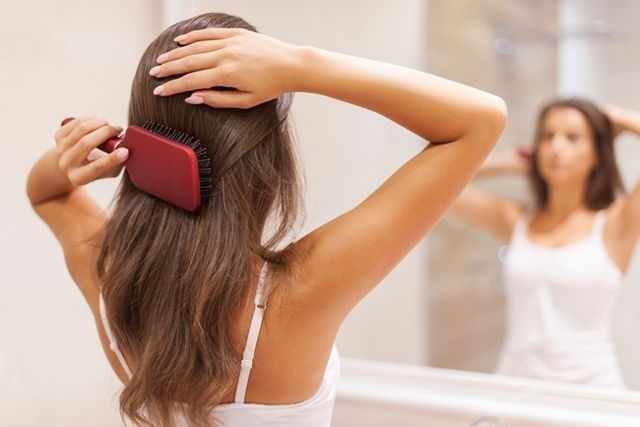Dandruff is an uncomfortable condition that is associated with small, white plaques of dead skin on the scalp, It is usually caused by increase oil production in the scalp or by fungal growth, and may result in symptoms like a burning sensation and itching of the scalp.
There are some home remedies that you can use to treat dandruff, like vinegar or lemon solutions. These help to control oil production and excess fungus that causes dandruff.
To control dandruff, it is also important to avoid washing your hair with very hot water, and to maintain a healthy diet that is low in fat. Hats can also contribute to dandruff build-up and make it worse.

How to treat dandruff at home
See the ways you can treat dandruff at home using the following remedies:
1. Apple cider vinegar
There are no scientific studies available to support the treatment of dandruff with apple cider vinegar. However, it contains properties that help to eliminate excessive fungus and bacteria that can contribute to dandruff.
The acidity in this vinegar also helps to remove dead skin cells and oil from the scalp.
How to use: Mix half a cup of apple cider vinegar with half a cup of water. Soak a cotton ball or gauze in the solution and rub into the scalp. Then massage the scalp with your fingertips for 2 to 3 minutes and allow to soak for another 20 minutes. Then wash your hair in cold water, making sure to dry it well. This can be done once a day to eliminate dandruff.
2. Aloe vera gel
The gel removed from an aloe vera leaf contains excellent medicinal properties that are great for the skin. It can relieve irritation and hydrate the skin. You can apply aloe vera gel to the scalp to decrease flaking and relieve itching and burning.
Aloe vera gel also contains antifungal properties that helps to regulate the natural flora on the scalp.
How to use: Remove the gel from inside an aloe vera leaf and apply to the scalp, massaging it gently with your fingertips. Leave it in for 30 minutes, then rinse with a neutral shampoo and cold water. You can repeat this 2 or 3 times per week.
3. Tea tree oil
Tea tree oil is a natural antiseptic that helps to eliminate fungus and bacteria. It can be used to treat many types of skin infections.
Because of these properties, thi soil can be added to a shampoo to relieve dandruff, especially if it is caused by increased fungal cells.
How to use: Squirt some shampoo into your palm and add 1 or 2 drops of tea tree essential oil. Scrub this mix into the scalp with your finger tips, then rinse it out with cold water.
4. Lemon juice
The vitamin C and antifungal properties of lemons help to dight dandruff and can prevent the excessive growth of fungal cells. In addition, due to its acidity, it helps to decrease itching, balance scalp pH and reduce scalp oiliness while promoting adequate hydration.
How to use: Cut a lemon in half and squeeze out the juice. Then soak a few cotton balls in the lemon juice and rub the juice into to the scalp. Allow to soak for 10 minutes, then rinse with cold water. It is important to cover your scalp if you go outside on a sunny day, as the lemon can burn the skin.
5. Sage and rosemary tea
Rosemary and safe contain anti-inflammatory and antiseptic properties that help to fight fungus that causes dandruff.
Ingredients
- 2 teaspoons of safe leaves
- 1 teaspoon of rosemary leaves
- 1 cup of boiling water
How to use
Add the safe and rosemary leaves to the cup of hot water and allow to soak for 10 minutes. Once it has cooled, strain the infusion and mix this solution with a bit of shampoo. Then wash your hair with this mixture. You can also apply sage extract to problematic areas of the scalp several times throughout the day.
6. Thyme tea
Thyme contains antimicrobial properties that help to combat fungus that causes dandruff. In addition, it boosts blood circulation to the scalp, which can strengthen hair follicles and heal the scalp.
Ingredients
- 4 tablespoons of thyme
- 2 cups of boiling water
How to use
Add the thyme to the boiling water and cover. Allow this infusion to soak for about 10 minutes. Once cool, then strain and apply to damp hair, making sure to massage it evenly into the scalp. Allow the hair to dry without rinsing the mixture out.
7. Elder plant tea
When applied to the skin, elder plant reduces inflammation, irritation and itching. Therefore, it is a great option for treating dandruff and an irritated scalp.
Ingredients
- 2 teaspoons of elder plant leaves
- 1 cup of boiling water
How to use
Place the leaves in the cup of hot water, cover and allow to soak for 15 minutes. Wash your hair as you normally would, and during the final rinse, apply the tea to your scalp and hair. Do not rinse it out, and allow the infusion to dry naturally.
8. Coconut oil
Coconut oil contains properties that help to hydrate the scalp and prevent drying out of the hair strands. It also contains an anti-inflammatory action that relieves itching, making it a great dandruff treatment.
Coconut oil additionally has antimicrobial properties, that controls the growth of fungus that causes dandruff on the scalp.
How to use: Apply coconut oil (in liquid form) on the scalp by massaging it into the skin with your finger tips. This helps it to penetrate into the follicle root. Then apply to the hair strands and ends. Once applied, cover the hair with a shower cap and allow to act for 20 minutes, then wash your hair as you normally would.
Be sure to check out other ways to get rid of dandruff at home or with medical treatment.
